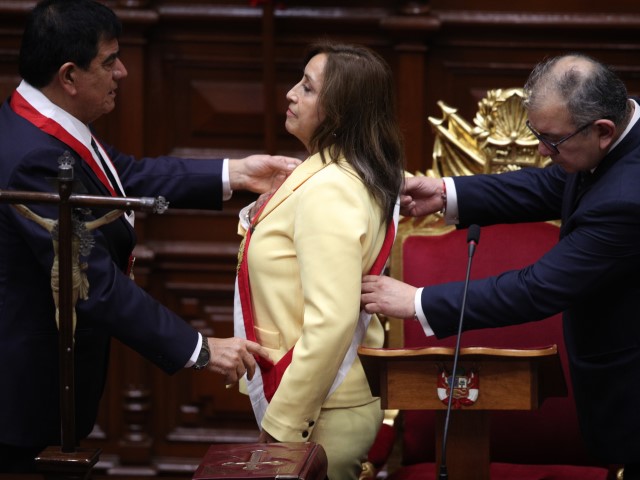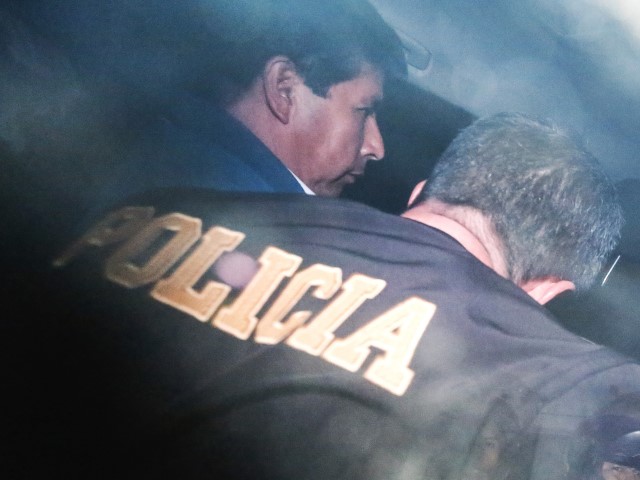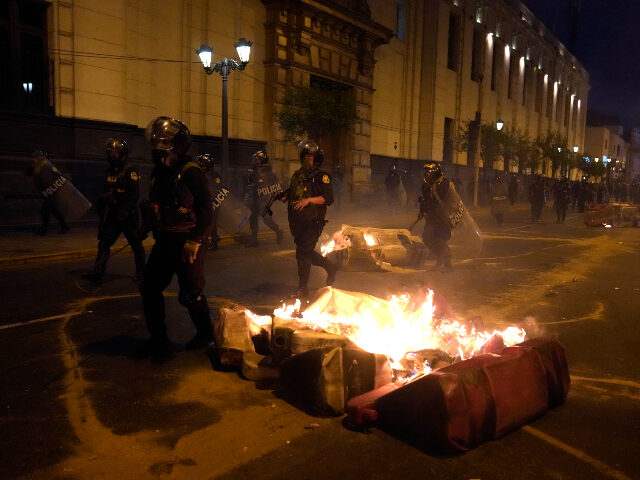Peruvian President Dina Boluarte announced on Sunday that she would soon present two proposals: to hold presidential elections this year, rather than in 2026 as planned, and “total” constitutional reform.
Boluarte vowed to make the changes if the nation’s Congress failed to pass the measures. The latter, a core demand of far-left rioters whose violence has resulted in 58 deaths and counting, would essentially result in a complete overhaul of Peru’s constitution. Leftists have been rioting in the country for nearly two months, erecting roadblocks to cut food supplies and burning down historic buildings, following the impeachment and arrest of unpopular communist former President Pedro Castillo.

President of Congress Jose Williams, left, and Sen. Jose Cevasco, place the presidential sash on Vice President Dina Boluarte as she is sworn in as the country’s new president, in Lima, Peru, Wednesday, December 7, 2022. (Guadalupe Pardo/AP)
Holding general elections in 2023 would reschedule the presidential election from the previously set date of 2026. As a result of a string of impeachments, arrests, and resignations, Boluarte is Peru’s sixth president in six years.
The ongoing violent protests, the death toll of which has now risen to 58 registered deaths, erupted in December in response to Castillo’s arrest after his failed attempt to stage a coup d’etat by dissolving Congress before it could impeach him. Castillo, for whom the rioters also want immediate freedom, is currently serving one and a half years of preventive imprisonment pending his trial, currently scheduled for June 2024.

Peru’s ousted President Pedro Castillo is escorted by police at the police station where he is being held in Lima, Peru, Wednesday, Dec. 7, 2022. Castillo was ousted by Congress and arrested on a charge of rebellion Wednesday after he sought to dissolve the legislative body and take unilateral control of the government, triggering a grave constitutional crisis. (Renato Pajuelo/AP)
In an effort to grant one of the rioters’ requests and quell the protests, Peru’s Congress had initially agreed to hold elections in 2024. This did nothing to placate the rioters, whose havoc then reached the capital city of Lima and resulted in the setting of a nearly 100-year-old historical building on fire. The residents of the historic building were left homeless.
The rioters have continued to maintain roadblocks – causing shortages of food, fuel, and other basic supplies – and have attempted to seize the nation’s southern airports.
The Peruvian Congress, at Boluarte’s request, convened on Saturday to debate and vote on the possibility of holding elections in October 2023. The motion was rejected with 65 votes against the proposal and 45 in favor.
Con 45 votos a favor, 65 en contra y 2 abstenciones, el #PlenoDelCongreso no aprobó el texto sustitutorio de los proyectos de ley 1897, 1918, y otros, que proponen establecer el proceso de elecciones generales para el 2023. pic.twitter.com/1KZogEfXim
— Congreso del Perú 🇵 (@congresoperu) January 28, 2023
Peru’s Congress ultimately agreed to reconsider the proposal on Monday anyway.
Congress’s rejection of the proposal prompted another wave of violence against law enforcement on Saturday, reportedly leaving at least 20 injured policemen and several injured civilians. A 55-year-old man became the latest to die in the riots.
President Boluarte, in a 13-minute address broadcast on Sunday, described the congressional session on Saturday as a “sterile debate that did not reach anything concrete,” except for the agreement to reconsider the proposal on Monday. Boluarte also expressed that she hoped that the proposal would be reconsidered “given the seriousness of the situation.”
Additionally, Boluarte said that if the Peruvian Congress does not reconsider the proposal to have general elections in 2023, she would present two bills. The first one would include provisions that cut the duration of her interim term and those of members of congress elected in the 2021 general elections, rescheduling general elections for the second Sunday of October.
The second bill would call for a session meant to begin a “total reform” of Peru’s constitution, which the nation’s next elected Congress would be tasked with overseeing. The resulting document from that session would be submitted to a vote via a referendum.
“The second proposal is a bill that is intended to settle once and for all the debate on the reform of the Constitution, an issue that is permanently used by some political forces to undermine any democratic solution to the current situation,” Boluarte said. “Specifically, I am referring to proposing that the next elected Congress entrust the Constitution Commission with the total reform of the 1993 Constitution. This bill fits perfectly into the expectation of the other sector of Congress that also wants to make political reforms through a constituent assembly.”
Peruvian authorities have claimed that members of the Peruvian Marxist terrorist organization Shining Path are involved in the ongoing wave of violent riots and have been inciting them. They have also accused foreign leftists groups and Bolivia’s former far-left President Evo Morales of inciting mob violence and separatist actions in Peru. Morales, despite not being Peruvian or having any historic ties to the country, is also promoting the idea of disposing of the Peruvian constitution.
Peru’s Congress convened again on Monday and is reconsidering the proposals at press time.

COMMENTS
Please let us know if you're having issues with commenting.